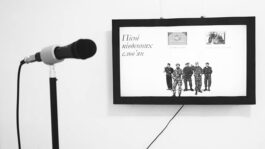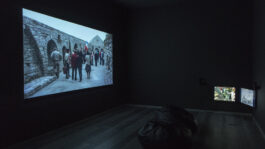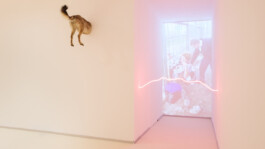
Song of the South Slavs. Karaoke
Information
2015, Installation: karaoke system, instructions on the wall
Special Thank: Michial Rashkovetskyi, Alexandr Tarasul
The interlocking and overlapping of disparate identities through music as both a source of entertainment and as a time-sensitive catalogue of sentiments is a key subject of enquiry in Nikolay Karabinovych’s artistic practice.
A longstanding predilection towards music from the Balkans evolved into an acute absorption with the so-called ‘turbo-folk’ style—propaga songs with a fast tempo, a salute to those in uniform, and a characteristically ostentation chorus—which reached maximum popularity during the Balkan conflicts over the last decades.
A defining peculiarity of turbo-folk is that there are abundant similarities in sonic effect between countries with a tradition of antagonized relationships. Though their respective forces fought on opposite sides of a frontline, the lyrics of Bosnian and Serbian songs from a war-ravaged era during which Yugoslavia dissolved are remarkably similar—two factions using identical instruments to stir the same morale with equally-opposing targets.
In translating the songs to Ukrainian and re-contextualizing them in the karaoke format, especially in Odesa—a city stereotypically associated with excesses of pleasure and pleasure which deleteriously morphs to ‘sin’— this work queries the ease with which hateful language becomes everyday, becomes entertainment, and becomes the norm rather than the exception.
At the same time, the work underscores the capacity for culture, particularly pop culture, to not even bear witness to, but bolster regimes—regardless of time, regardless of platform, regardless of whether the audience numbers in the thousands, hundreds of thousands, or millions. Archives of this material abound at the click of a button. The words heard, the phrases repeated, the rhymes between this and that… they put the listener through a boot camp.
Wittingly or not, the listener has conscripted.
Even if the cause isn’t their own.
A fascination with music from the Balkan region led me to turbo-folk—a variably stigmatized, beloved, problematized, heralded, and dramatized genre with at times subtle, often overt political and/or nationalistic overtones. This encounter occurred when the war in Ukraine had reached its loudest pitch… when the news was dominated by reportages about war and extrajudicial activity. In that moment, many musicians in Ukraine started to record patriotic songs—incorporating a gold rush of lyrical material borne of sacrifice and blurred valor.
I watched hours and hours of music videos on Youtube. Sometimes, I could not discern whether the song I was hearing was Serbian or Bosnian. All the songs rode a wave of rising patriotic sentiments and touched on a tendency to resort to armed aggression to stave off an enemy.
I chose two of the most popular turbo-folk songs, translated them into Ukrainian, and turned them into karaoke ballads.
It was my work for the 4th Odesa Biennale and first part of Song of the south Slavs.
Exhibitions
Press
ARTUKRAINE by Max Kovalchuk

